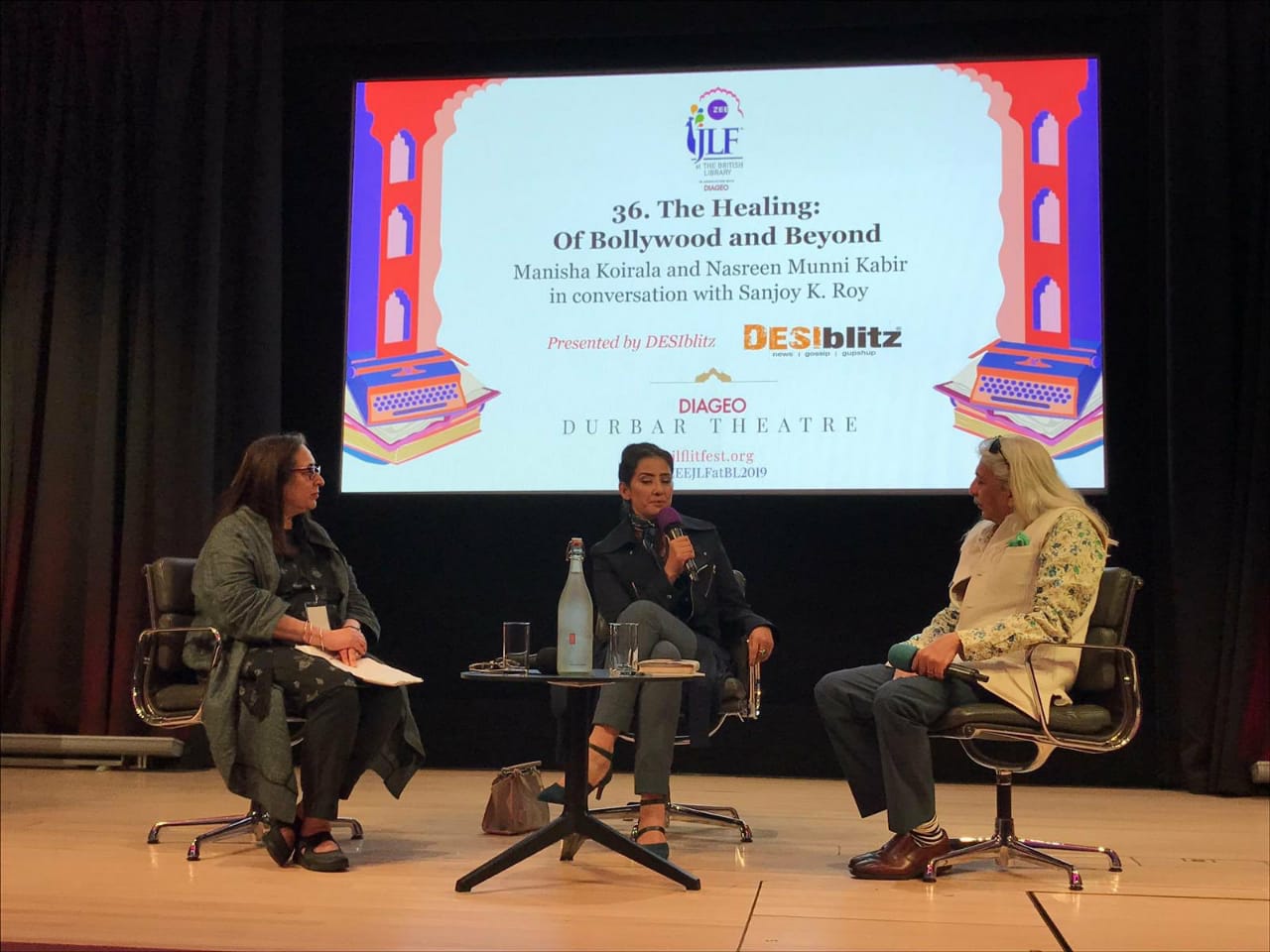


The Healing: Of Bollywood and Beyond Manisha Koirala and Nasreen Munni Kabir in conversation with Sanjoy K. Roy
In the closing session, the audience at ZEE JLF at the British Library was able to meet Bollywood actor Manisha Koirala up close, who has recently revealed her story of battling ovarian cancer, in her book titled Healing: How Cancer Gave Me a New Life. Koirala, along with filmmaker Nasreen Munni Kabeer, discussed her life inside and outside of Bollywood, and her newfound will to battle for the life that she is grateful for. Sanjoy K. Roy, Managing Director of Teamwork Arts, the producer of the Festival, moderated the session, bringing in his long friendship with the actor, and the fanhood that has sustained throughout these years of knowing her.
The discussion started with that of the trajectory of women in Bollywood and the roles that Koirala has played as a woman. Kabir described that for the last few decades, especially during Koirala’s advent into the Hindi film industry, it has been the men at the centre, until the recent phenomenon of women steadily taking over a lot of screen presence. However, all through, “when Manisha came into film, she brought a lot of dignityâ€.
Roy asked Koirala about her decision to move to Mumbai, and she revealed that it had been an organic movement; the reaction that she received from directors, fellow actors actors, and her fans, has always been positive. She said she had her grandmother to thank, and, of course, the perfect alignment of the stars (no pun intended).
Her book reveals a reconciliation with mother, said Roy. The actor said that because of political turmoil in Nepal, her mother had to leave her with her grandmother at the age of 7 or 8. At such a young age, she could not fathom the sense and purpose of such abandonment. This sense of loss and abandonment revisited her in her later years battling cancer: “when I got diagnosed with cancer, I felt that life was abandoning me.â€
Kabir revealed that upon watching Manisha on the screen in 1942: A Love Story (1994), despite the sparkle that she bore that is usually tangible in Bollywood stars, she could still identify with her, which was a unique experience. “Ultimately, the director has to see the talent. Through the 90s, the best of directors cast her. Especially Mani Ratnam has been known for being particular about who he casts, and quite unusually he had her in two films: Bombay (1995) and Dil se (1998). So, it is not I but director who catches the talent.†She added how Koirala’s oeuvre also includes some well-deservedly famous songs, which according to Kabir, are the essence of Bollywood.
Did stardom change her, Roy wondered? Koirala responded that she didn’t realise until she had to sit back and reflect. Her cancer diagnosis allowed for a moment of authenticity and honesty. “I realised how marvellous, how gifted my life was. I got beautiful career break, directors, and co actors, how slowly I had started taking it for granted. When I was facing death, I realised that if I get a second chance at life, I decided on how different I would be, how grateful, and that I will work harder.â€
Manisha’s book tells her story of the processes of knowing, acknowledging, and battling with cancer, even after her first successful surgery in New York. The struggle is also psychological, dealing with fears, insecurities, criticism, and despite all the lows, of hoping against hope. She waited for six years before she decided to write Healed. Her book, said Koirala, is an attempt to add positivity in the world: “to give hopeâ€, since several such stories and accounts helped her retain hope in her struggle for life. “We need to change the narrative; I don’t think we need to be scared about sharing our stories.â€



Leave a comment